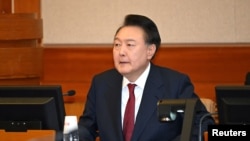ນາຍົກລັດຖະມົນຕີເກົາຫຼີໃຕ້ທີ່ຖືກຟ້ອງຮ້ອງ ກ່າວຕໍ່ສະພາແຫ່ງຊາດໃນວັນພະ ຫັດມື້ນີ້ວ່າ ທຸກຄົນທີ່ຢູ່ໃນການປະຊຸມລັດຖະມົນຕີທີ່ຈັດຂຶ້ນຢ່າງເລັ່ງດ່ວນ ສະແດງໄດ້ເຖິງຄວາມເປັນຫ່ວງກ່ຽວກັບແຜນກົດໄອຍະການເສິກຂອງປະທານາທິບໍດີ ທ່ານ ຢຸນ ຊຸກ ໂຢລ ກ່ອນທີ່ທ່ານຈະປະກາດແຜນດັ່ງກ່າວໃນວັນທີ 03 ທັນວາປີກາຍນີ້.
ທ່ານ ຮັນ ດອກ ຊູ ຊຶ່ງດຳລົງຕຳແໜ່ງຮັກສາການປະທານາທິບໍດີຊົ່ວຄາວຫຼັງ ຈາກ ທີ່ ທ່ານ ຢຸນ ຊຸກ ໂຢລ ຖືກຟ້ອງຮ້ອງ ແລະ ຖືກພັກວຽກເມື່ອວັນທີ 14 ທັນວາ ກ່ອນທີ່ທ່ານເອງຈະຖືກຟ້ອງຮ້ອງ ໃນວັນພະຫັດມື້ນີ້ໄດ້ເຂົ້າຮ່ວມກັບ ທ່ານ ຊອຍ ຊັງ ມອກ ລັດຖະມົນຕີກະຊວງການເງິນ ຮັກສາການປະທານາ ທິບໍດີໃນການປະເຊີນການຊັກຖາມຂອງລັດຖະສະພາກ່ຽວກັບບົດບາດຂອງພວກທ່ານໃນການຕັດສິນໃຈປະກາດກົດໄອຍະການເສິກທີ່ສ້າງຄວາມຕົກໃຈ.
“ທຸກຄົນຄັດຄ້ານແລະສະແດງຄວາມເປັນຫ່ວງແລະຍົກບັນຫາທີ່ເກີດຂຶ້ນກັບການຕັດສິນໃຈຄັ້ງນີ້ຕໍ່ທ່ານປະທານາທິບໍດີ,” ທ່ານ ຮານ ກ່າວຕໍ່ຄະນະກຳມະການພິ ເສດ ໂດຍອ້າງເຖິງການປະຊຸມທີ່ ທ່ານ ຢຸນ ຊຸກ ໂຢລ ໄດ້ແຈ້ງໃຫ້ສະມາຊິກ ຄະນະລັດຖະມົນຕີບາງທ່ານຮັບຮູ້ເຖິງຄວາມຕັ້ງໃຈທີ່ຈະປະກາດກົດໄອຍະການ ເສິກ.
ກົດໄອຍະການເສິກໃຊ້ເວລາປະມານ 6 ຊົ່ວໂມງ ກ່ອນທີ່ ທ່ານ ຢຸນ ຊຸກ ໂຢລ ຈະຍົກເລີກຄຳສັ່ງດັ່ງກ່າວທ່າມກາງການຄັດຄ້ານຈາກສະພາແຫ່ງຊາດ. ແຕ່ກົດ ດັ່ງກ່າວໄດ້ສົ່ງຄື້ນຄວາມຕົກໃຈໄປທົ່ວເສດຖະກິດທີ່ໃຫຍ່ເປັນອັນດັບສີ່ຂອງເອເຊຍນັ້ນ ແລະ ກໍ່ໃຫ້ເກີດວິກິດການທາງການເມືອງທີ່ທະວີຄວາມຮຸນແຮງຂຶ້ນ.
ທ່ານ ຊອຍ ຊັງ ມອກ ກ່າວຕໍ່ຄະນະກຳມະການວ່າ ຄວາມທ້າທາຍທີ່ຍິ່ງໃຫຍ່ ທີ່ສຸດໃນປະເທດຂະນະນີ້ ລວມເຖິງຄວາມເປັນຢູ່ຂອງປະຊາຊົນ ແລະການປ່ຽນ ແປງໃນລະບຽບໂລກ.
“ມັນມີຄວາມຈຳເປັນຕ້ອງເຮັດໃຫ້ການບໍລິຫານຂອງລັດຖະບານ ມີສະຖຽນລະ ພາບ”
ໃນວັນພະຫັດມືນີ້ ທ່ານ ຢຸນ ຊຸກ ໂຢລ ໄດ້ປະກົດໂຕໃນການພິຈາລະນາຄະດີ ຟ້ອງຮ້ອງຂອງທ່ານ ທີ່ສານລັດຖະທຳມະນູນຊຶ່ງຈະຕັດສິນວ່າ ຈະໃຫ້ທ່ານກັບ ເຂົ້າຮັບຕໍາແໜ່ງຫຼືປົດທ່ານອອກຈາກຕໍາແໜ່ງຢ່າງຖາວອນ.
ເຈົ້າໜ້າທີ່ທະຫານລະດັບສູງໄດ້ໃຫ້ປາກຄຳຕໍ່ສານກ່ຽວກັບບົດບາດຂອງພວກ ເຂົາ ໃນການສົ່ງທະຫານເຂົ້າໄປໃນສະພາແຫ່ງຊາດໃນຄືນນັ້ນ. “ ພາລະກິດຂອງຂ້າພະເຈົ້າກໍຄື ປິດກັ້ນອາຄານລັດຖະສະພາ ແລະຫ້ອງປະຊຸມ ຂອງສະມາຊິກ ແລະຮັກສາຄວາມປອດໄພອາຄານເຫຼົ່ານັ້ນ,” ພັນເອກ ຄິມ ຮຍຸນແຕ ຜູ້ນໍາກອງກຳລັງພິເສດພາກພື້ນດິນປະມານ 97 ຄົນກ່າວ.
ອ່ານຂ່າວເປັນພາສາອັງກິດ
South Korea's impeached prime minister told parliament on Thursday that "everyone" in a hastily-arranged meeting of ministers expressed concerns about President Yoon Suk Yeol's martial law plan before he announced it on Dec. 3.
Han Duck-soo, who was briefly acting president after Yoon was impeached and suspended from power on Dec. 14, before being impeached himself, on Thursday joined acting President Choi Sang-mok, the finance minister, in facing parliamentary questioning over their role in the shock martial law decision.
"Everyone objected and expressed worry and raised the problems with this decision to the president," Han told a special committee, referring to the meeting where Yoon told some cabinet members of his intention to declare martial law.
The martial law lasted around six hours before Yoon rescinded the order in the face of opposition from parliament, but it sent shockwaves through Asia's fourth-largest economy and sparked a spiraling political crisis.
Choi told the committee that the biggest challenges in the country right now include the livelihood of the people and changes in the international order.
"There's the need to stabilize government administration," he said.
Yoon appeared on Thursday at a hearing in his impeachment trial at the Constitutional Court, which will decide whether to reinstate him or remove him permanently from office.
Senior military officials testified in the court about their role in deploying to parliament that night.
"My mission was to blockade the parliament building and the members' hall, and secure those buildings," said Army Colonel Kim Hyun-tae, who personally led about 97 special forces troops on the ground.
Kim said after they entered the building, his commander, Kwak Jong-geun, ordered him to get in the main chamber of the building where lawmakers had gathered to lift the martial law.
"(My commander) asked if we could get in because he said there shouldn't be more than 150 people," Kim testified, though he said he did not know the significance of that number at the time, or whether his commander meant lawmakers.
Kwak, the commander of the Army Special Warfare Command, has said he was told to stop 150 lawmakers or more from gathering, the quorum needed to vote down the martial law decree.
Kim said he told Kwak his troops were not able to enter the chamber. Eventually 190 lawmakers defied the cordon to vote against Yoon's decision.
Kwak took the stand at the court later on Thursday and faced Yoon in the same courtroom. Kwak has been saying that Yoon directly ordered him to "drag out" lawmakers but Yoon did not ask him to protect civilians or withdraw his troops, contradicting Yoon's claims.





ຟໍຣັມສະແດງຄວາມຄິດເຫັນ